Well maybe Olympic collars aren’t the most important piece of equipment ever, but I didn’t want a boring title for a somewhat boring article. Sue me!
This is a guide to the great number of our Olympic collar options, and boy are there many! Other than to mention that I cover both the basic, mostly weightless Olympic collars and an assortment of weighted, professional Olympic collars (all 50 mm, or ~2″ collars), this guide really does not need much of an introduction.
This article features no Standard 1″ collars, it is purely Olympic-sized collars.
Last update: January 2018. Minor revisions, link and price verification, etc.
Basic Olympic Collars
This first section contains basic collars. They are mostly inexpensive and not deliberately weighted or intended for competition.
Classic Spring Collars
We have all owned spring collars; probably still do somewhere. They mostly work, and they just scream “I’m cheap!” Over time they’ll stop holding on to the sleeve so well; especially if you leave them on the bar in-between workouts, but for around $10 you can replace these over and over.
Other than being inexpensive, there aren’t any advantages to spring collars. They have no substantial weight to them, youth and female lifters with small hands frequently have a hard time getting them on and off the bar, and they don’t work on most specialty bars. They do hold pretty well when they’re new, especially if your bar has grooved sleeves, but you will want to make sure you open them up as much as possible when putting them on or off to avoid taking the zinc or chrome coating off your bar.
Cheaper than Cheap – Spring Clamps
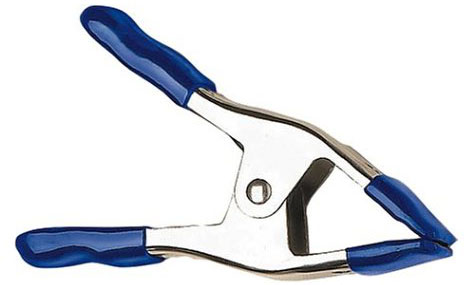
If spring collars aren’t quite cheap enough for you, look for a pair of these 2″ spring clamps in your garage. They’ll work so long as you aren’t dropping the bar (rows, deadlifts, Olympic lifts, etc.) Then again maybe they won’t hold; I haven’t tried because I own collars.
About the only possible pro I can think of to using this super cheap makeshift collar is that they’ll also work on specialty bars.
Lockjaw Pro Collars / HG Collars
Lockjaw / HG Collars are probably the most common alternative to spring collars. They’re a lot easier to use, they lock on to the bar more securely (and stay put when dropped), and they won’t scratch up your bar sleeves. They also fit some specialty bars that spring collars will not, although it’s not a very tight fit. You can pick these up for about $35-$40 just about anywhere.
Be careful if you buy these from someplace like Amazon that also sells Standard equipment (1″ rather than 2″), as these are available for both sizes and they look almost identical at a quick glance. Don’t buy the wrong sized set.
Muscle Clamps
Muscle Clamps are great collars, in the right setting. They are extremely easy to use, they don’t scratch up the bar sleeves, and they hold very well. Where you wouldn’t want to use them is when you do a lot of bar dropping – these are not the best collars for snatch and clean & jerk training; they will pop open (not that Olympic lifters train with collars anyway!)
You’ll commonly find Muscle Clamps in commercial gyms because of how reliable and easy to use they are in that kind of setting. Since you can’t normally drop loaded barbells in most globo-gyms, their Oly weakness is never really exposed. I have these collars and I like ’em a lot, but I keep them in the rack for benches, squats, etc. $38 from Rogue, black only. Red and potentially other colors can be found on Amazon.
Proloc Collars
Proloc Collars are great; they will hold on to extreme weights better than spring collars will, and for years longer! They are simple to use and they are much more likely to fit specialty bars like logs, Swiss bars, cambered bars, and so forth (range of 1.937″ – 2.007″). Proloc collars are available in black or red – $42. You can also find some other random colors on Amazon.
Then there are the Proloc 2 Collars that come with a 5/8″ carabiner attached to each collar for hanging chains. Same easy and solid lock down, but now with the ability to easily and quickly add some lifting chains – $59.
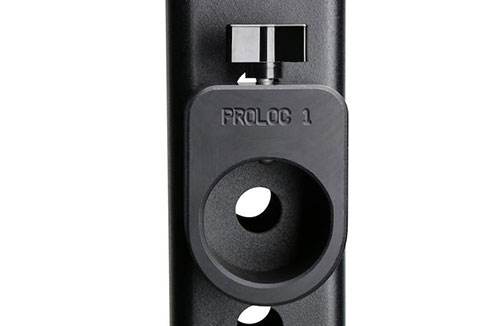
And finally, American Barbell offers magnetized versions of the Proloc Collar. “WHY?”, you wonder? Well so you can slap the collar on the uprights of your power rack when not in use. Admit it, it’s a good idea!
Aluminum OSO Barbell Collars
For adding a little bit of style to function, maybe take a look at some OSO Collars. These aluminum collars come in a variety of metallic colors, and they work much like Lockjaws in the way they attach to the bar. They can withstand lots of high-impact drops without coming loose, and they are even easier to attach and remove from the bar than the HG 2.0 collars.
OSO Collars are a little on the pricey side considering that they are slightly fragile (they’re not to be dropped, and they won’t handle being stepped on or crushed by plates), but they are a very attractive collar, and they really aren’t that much expensive than Muscle Clamps or HGs.
OSO also offers the Mighty Collar, an economical, super lightweight version of the OSO. Same basic design, same function, and same holding power, but available for half the cost. Reviews are solid and they do have a two year warranty, so why not, right?
Alternatively Rogue has their own branded Aluminum Collars that are basically just an OSO collar with a slightly different design. They are made of the same 6061 Billet Aluminum, are about the same overall size, and function in the same manner. Price is also pretty much the same. They look classy, but between these and standard OSO I think it’s six of one; half a dozen of the other.
Rogue HG 2.0 Axle Collars for 1.9″ Specialty Bars
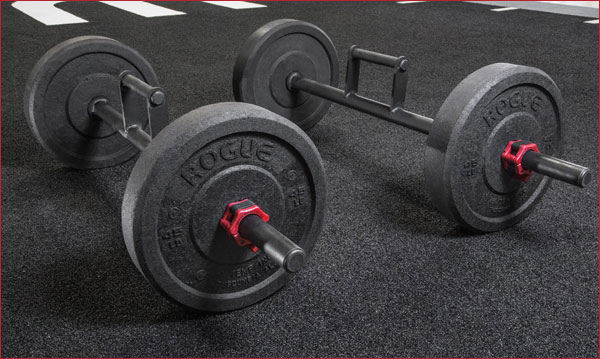
Rogue HG 2.0 Axle Collars being used on Rogue Farmer’s Handles
These work exactly like the Rogue HG Collars/Lockjaw Pro Collars. They are $36.50 a pair, in orange’ish red only. Again, these will not work on your standard Olympic barbell.
Strongman Pipe Collars for 1.9″ Specialty Bars

Steel pipe Strongman collars.
Depending on where you find these, pipe collars can be a cheaper alternative to Rogue’s Axle Collars for specialty bars. These collars are literally pieces of steel pipe with a large hand-cranked bolt for tightening onto the bar sleeve. I wouldn’t recommend these for any bar that has a zinc, chrome, or really any finish that you care about because these collars will scratch your bar up good. I use pipe collars for my farmer handles, but I sure wouldn’t put them anywhere near a real Olympic bar.
I suggest you take the price of these ($30-50/pair) and apply that to some Axle Collars or Proloc collars. Either of which are much easier to use anyway. Just my 2 cents.
Strap Barbell Collars
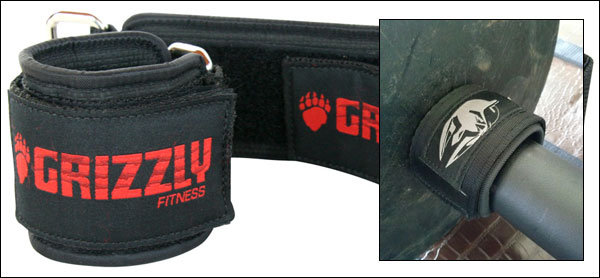
Strap Barbell Collars fit any diameter bar sleeve, but don’t really hold much better than spring collars.
Little disclaimer, I’ve never used these, nor would I if I had to buy them myself. I wanted to include them though, so I dug and dug until I found a fair amount of user feedback.
The word is that strap collars kind of work, but are not an improvement over spring collars. The only clear advantages to strap collars is that they travel easy (if you still lift at a globo gym that has shitty collars, and need to bring your own), and that they technically do fit any size bar sleeve.
Like I said, I’ve not used these personally, but the feedback I kept running into was pretty consistent; you can do better for the money. So for the $20-$30 price tag, you may as well just buy Lockjaw or Muscle Clamps. Kind of a dumb idea if you really think about it.
♦ ♦ ♦
Weighted and/or Competition Collars
Let’s talk about real collars. That is, collars that have some weight to them. These collars will cost more dough, but they do allow you to know exactly what weight you’re lifting, they tend to hold stronger on the bar, and the bulk of them just look cooler.
A Warning about Collars and Sleeve Sizing
If you have a lower end barbell; something you found at Academy, Dicks, Amazon, etc for like $100 or less (CAP, Gold’s, Body Solid, Troy, and so forth), be warned that these higher-end competition collars may not fit your bar.
IWF-spec’d barbells have sleeves that fall between 49.5 mm and 50 mm in diameter (1.949 inches – 1.969 inches.) The insert (or opening) of competition collars fall between 50.2 mm and 50.8 mm (1.976 inches – 2.0 inches). Cheap box-store bars that are advertised as a ‘2″ Olympic Bar’ is already be too big for most calibrated equipment (discs and collars) even at exactly 2″, but because they aren’t manufactured to very strict tolerances, they can be even thicker (of course they could be smaller too – you just never know).
Don’t buy competition collars, competition bumpers, or change/friction plates if you own a cheap, 2″ chain-store bar. Stick with spring collars, Lockjaw collars, or Muscle Clamps. Or rather, buy a real bar. It’s really not the piece of equipment to be cheap on!
I realize a person with a $90 barbell isn’t going to be buying $175 collars, but I mention it anyway (better safe than sorry.)
Ivanko Chrome 2.5 Kilo and 2.5 Pound Collars
Ivanko offers professional weighted collars in both pounds and kilograms, which is a pretty cool thing. Most of the weighted competition collars are going to be in kilos, so it’s nice that folks who lift in pounds can get heavy collars too. Ivanko Pressure Collars are IPF-certified, but no Ivanko collars are IWF-certified (just FYI).
The Ivanko Kilo Pressure Collars are cast iron collars calibrated to fit any IWF-standard Olympic barbell. Each collar weights 2.5 kg and has a nickel base applied before it is triple chromed. Beautiful collars – approx $130
The Ivanko Chrome Training Collars are similar to the above kilo collars, but rather than kilos they are 2.5 pounds per collar. They look a little different but they are effectively the same thing. These are also very good looking collars – approx $80
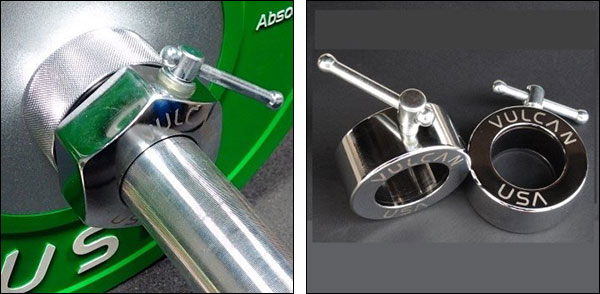
Vulcan offers similar Competition and non-Comp compression collars in kilos.
Vulcan offers the same Competition Compression Collars as Ivanko does, and they do so for about the same price of $130. Other than Vulcan etching their logo into the front side of the collar they look identical.
Vulcan also offers the same Chrome Training Collars as Ivanko, only they offer them in a 2 kg pair rather than a 5-pound pair. I would have thought that was a weird amount of weight to have to add to your totals but people really seem to love them – lots of positive feedback out there for them, and the price is fair at $67.
Bulldog Olympic Collars – 2.5-pound set
I’ve heard mixed feedback on Bulldog Collars. They’ve got a very nice aluminum body and steel hardware, and they look pretty cool, but word is they don’t stay locked down very well, and require constant tightening. At $60 a pair, that’s not really what you want to hear.
I also don’t think I’d want a pair of collars that weighed 1¼-pounds each; that seems like an overly complicated number to have to work with. Finally, although these look as though they may fit specialty bars, they will not.
In any case, this is another brand that global gyms will use, so if you have experience with them and like them, by all means get yourself a pair.
Rogue KG Competition Collars
Rogue’s KG Competition Collars are a nice alternative to the IWF Competition collars for home gym lifters being that they’re like $45 less ($210), but they aren’t IWF-certified like the NxG’s so they’re no good for weightlifting events. That said, they actually are IPF-certified, so they can be used in powerlifting meets along with Rogue’s kilogram Ohio Power Bar and Calibrated Discs.
Like all certified collars, these are 2.5 kg per collar and sold in pairs. They are CNC milled and then finished in chrome. Yes the handle moves out of the way so change plates can be loaded flush against but outside the collars (a large improvement over the original Rogue Comp Collars, I might add.)
Uesaka Sevi IWF-Approved 2.5 kg Competition Collars
If you were going to buy IWF Competition Collars but thought to yourself “these just don’t seem expensive enough”, then try these!
The Uesaka Sevi Collars are only $283 and they too have a very unique look to them. These are IWF-approved and weigh exactly 2.5 kilograms per collar. They are finished in hard, brilliant chrome and create an super firm lock on the bar. They are also backed by a 5-year warranty which is 3-years longer than the Swede’s warranty; which based on my calculations makes these an incredible bargain by comparison. (mild sarcasm)
Other IWF Competition/Training Collars
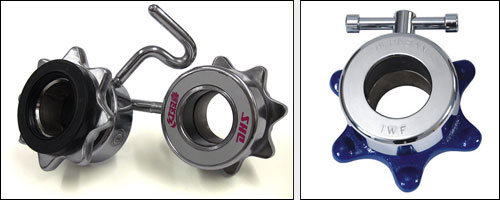
There are many IWF-certified competition and training collars.
Every IWF and IPF-certified barbell manufacturer has 2.5 kilogram collars; some are even magnetic! The Uesaka’s from above aren’t even the most expensive. If you want DHS, Leoko, ZKC, or WerkSan collars to match your bar, you can grab those from the manufacturer. Expect to pay $200-300+.
Husker Powerlock Compression Collars
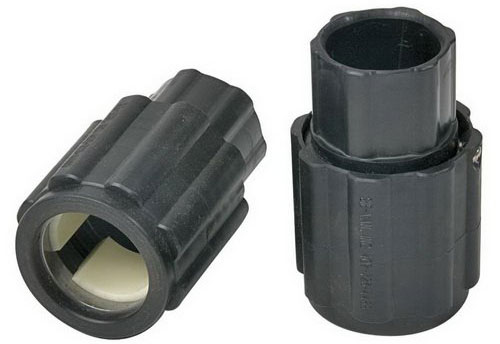
These giant, steel compression collars from Husker have been around since the mid 80’s. They quickly and easily lock down tight on the sleeve, and can be removed just as quickly and easily as well. The word is that these are all but indestructible, but I personally find the excessive length to be less than ideal since it absolutely restricts loading capacity.
People who like them seem to really like them, but the length I just mentioned along with the $60+ price tag makes them less than appealing for powerlifting purpose, but perhaps a good choice for lots of high-impact drops like in CrossFit or Olympic training.
MostFit Syn Rings
They aren’t really collars in the normal sense. I saw these some time ago and thought they were a creative alternative to hanging kettlebells with resistance bands. I’m not sure how beneficial suspending weights from a bar actually is, but I’d imagine the instability does help to improve stabilizer muscles to some degree. Syn Rings are only about $50 and they can be found on Amazon or random fitness retailers.
Olympic Collar Summary
I found a number of other random collars out there, but they were all more or less the same as one of the above collars with minor cosmetic differences, or just different brands of the same product. If you can’t find collars that you like in this list, you’re probably just too hard to please!
My Collar Recommendation?
I think for most garage gyms and general strength training purposes (including CrossFit), either the Lockjaw/HG, some version of OSO Collar, or the Muscle Clamps would be fine. Remember though, avoid the Muscle Clamps when Olympic lifting.
If you prefer professional 2.5 kg collars, for personal use just go with Vulcan’s or Rogue’s. If you need collars for an event, you’ll probably be required to use one of the IWF-certified or IPF-certified brands and models like Ivanko (IPF), Rogue (IPF), or Uesaka (IWF).
You don’t have as many choices for specialty bars, but of those options I prefer the Rogue Axle Collars. Prolocs are great too, I just don’t personally like turning knobs and screws.
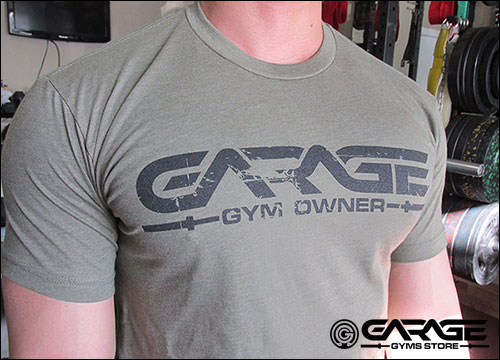

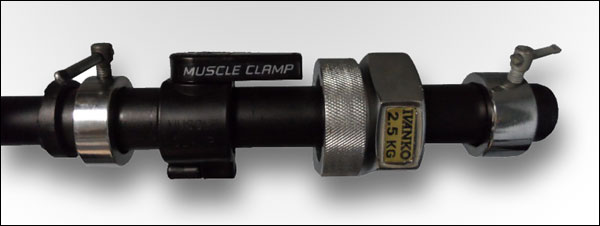
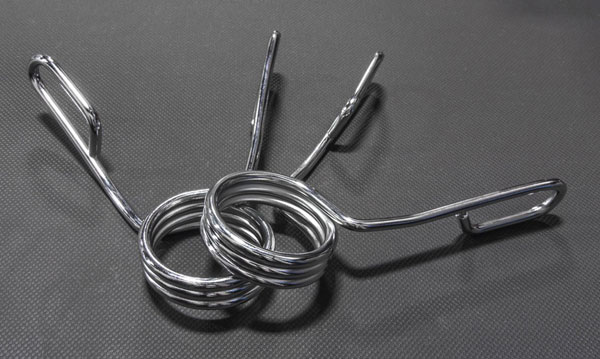
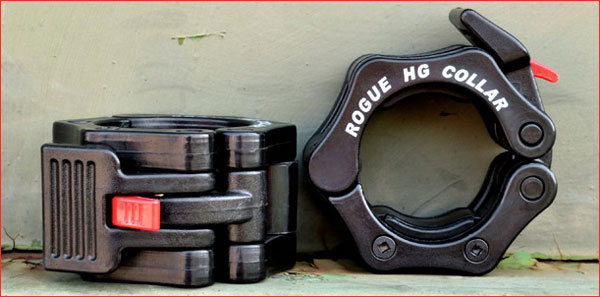
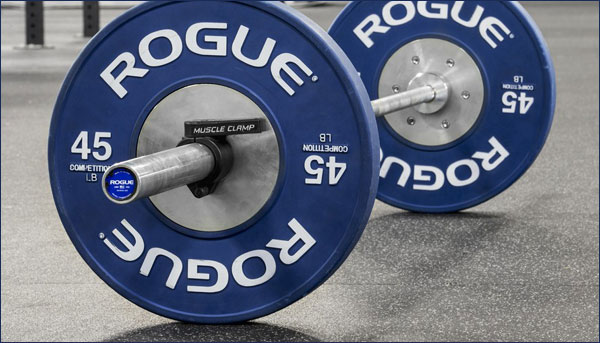
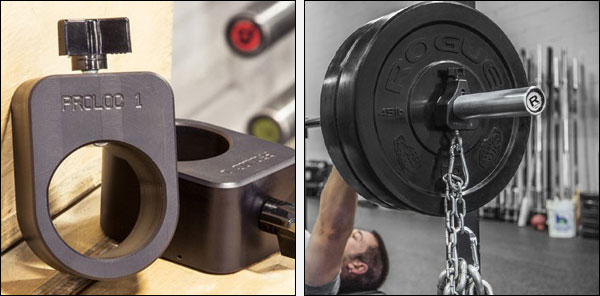
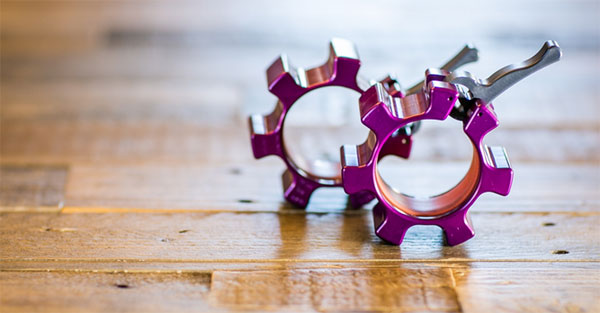
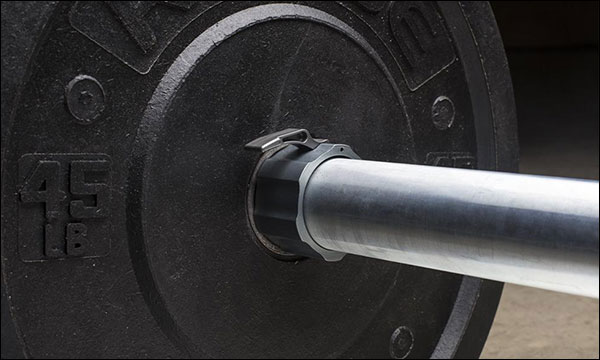
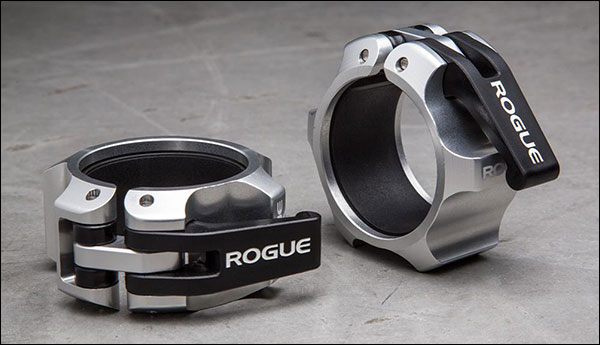

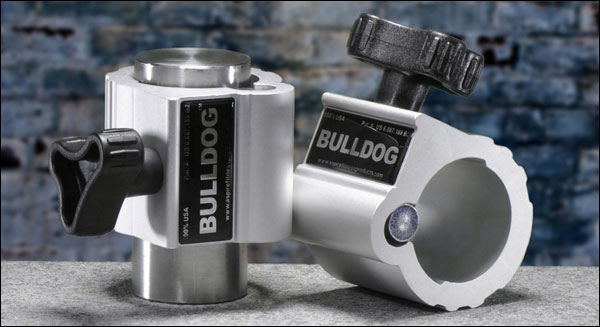
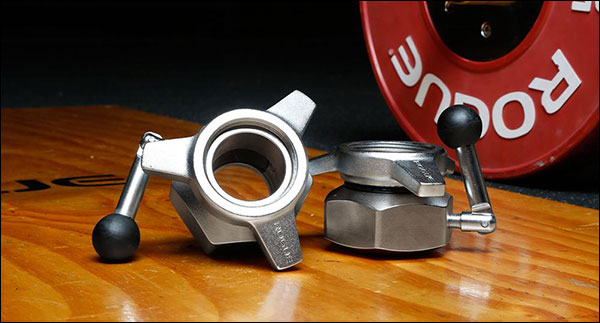
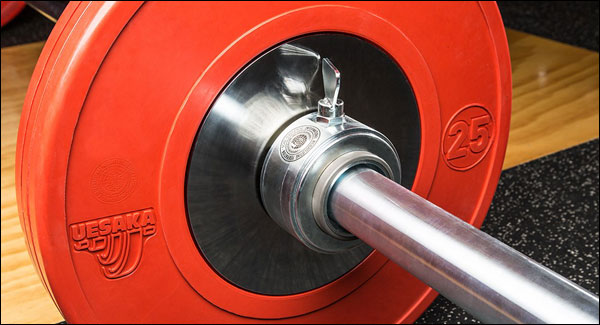
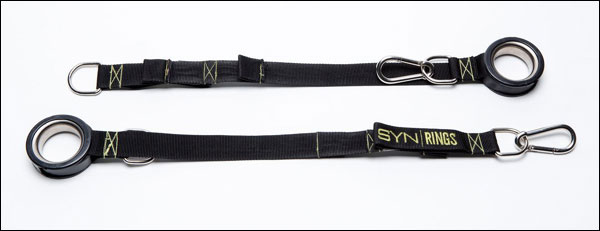
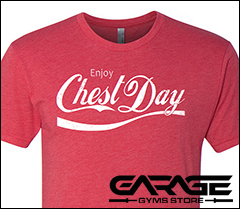
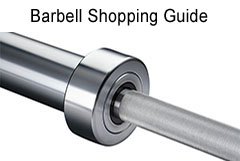
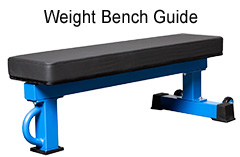
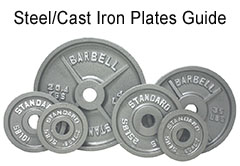
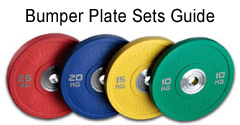
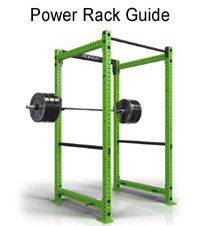
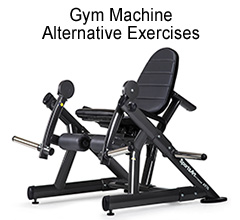

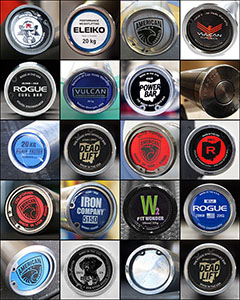

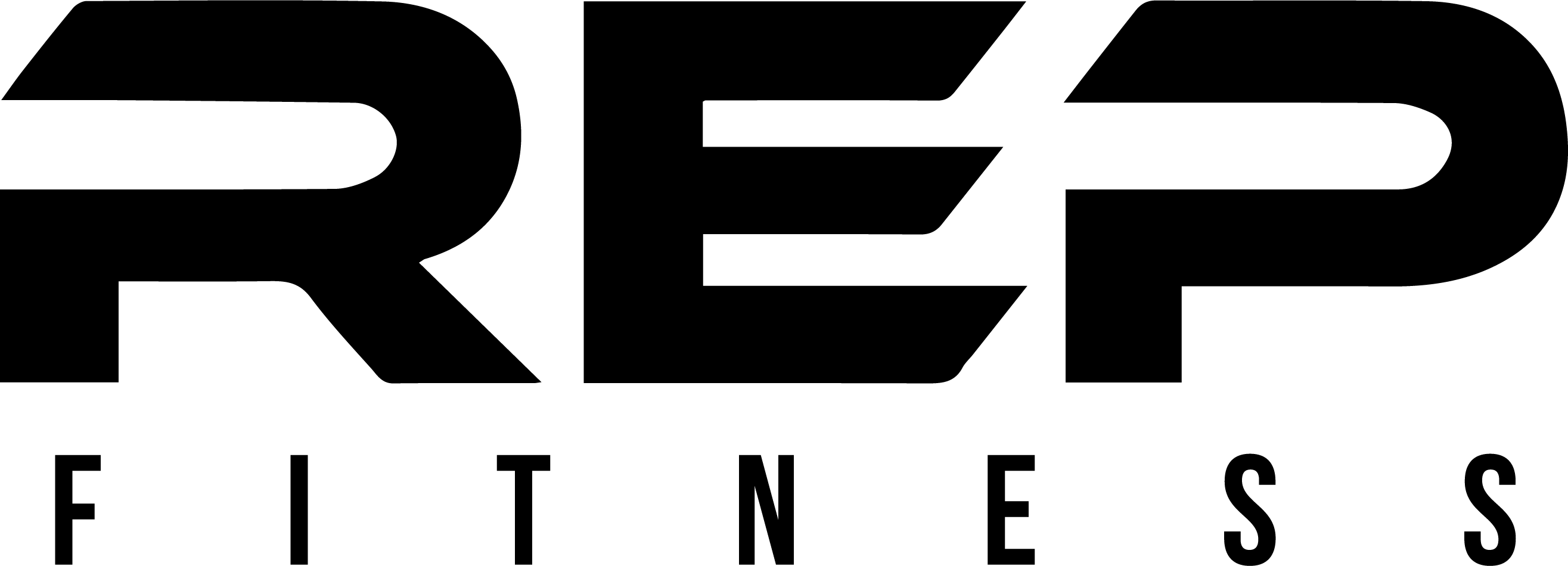
What about this ones: https://www.pinterest.com/pin/497014508851960103/
Little feedback on the OSO. Literally the greatest collar I have ever used. these hold almost as well as a compression Comp collar. They hold worlds snugger than any spring, clamp, Jaws, etc. Especially if you are doing a crossfit style multi overhead drop work outs. I personally dropped 100KG’s 30 times from over head and never had to tighten the weight! Plus compared the Lock Jaw, my wife loves them, because the long latch is much easier to release than the red button on the Lock Jaw.
Awesome to hear, thank you. I’ve actually got them on my list of ‘to try’ things. I do wish they were weighted tho
Little feedback on the OSO collars. There are 2 sets floating around the gym that only get used by people that Oly lift and not crossfit. One set is still holding its tightness but one is starting to fail. We lined the inside of the collar with white lifting tape to get some of the tightness back but its finicky. Still a great collar though and I hope the set that is still going strong holds up.
Personally im looking at the Vulcan collars. They seem like a very nice collar for the money.
On a side note, after reading your Oly bar review, I ended up getting the Vaughn bar. Man what a great bar for the money. I do see the Vulcan Oly bearing bar in my future though ;)
Thanks for the feedback Chris. Glad you like that Vaughn. I have the Vulcan Elite as of Friday; the bushing variation of the Pro bar, and so far it’s looking like a pretty damn nice bar. It’s also a very attractive bar. The entire sleeve looks great, from the chrome to the dark end caps. Very excited to test that one out tomorrow.
I was wondering about the comp collars… do you actually have them, or were you just posting info about them? Based on your recommendations, I bought an American Barbell and love it. However, they now longer sell their comp collars. I bought a set from Fringe Sports and they didn’t it. Just wondering if you could measure the inner diameter or test them on your American BB bar?
Wait sorry, I’m confused. You bought an AB bar? or the collars? I see the collars on the website now, maybe they were sold out for a while? Your comment about the Fringe collars is missing a word, but I assume the missing word is fit. Which bar are they not fitting on, and which collars specifically from Fringe? The Vaughn?
Sorry… writing a few reports right now and I guess they received the grammar proofing. I bought an AB stainless barbell. It’s superb. I bought collars from Vaughn/Fringe and they didn’t fit. Sorry for the typo and confusion. I do see now that AB has collars back in stock. I was told by one of the reps for AB that the collars were discontinued and they were figuring out a different design. I guess that’s no longer the case.
Sorry for the confusion.
Ah ok I got it, no worries. You wouldn’t believe how much I have to edit before I hit publish on anything.
So ok, the high-end American Barbell bars have that extra layer of hard chrome, but that shouldn’t prevent the Vaughn collars from fitting. If you were going to have issues because of the extra thickness, you wouldn’t be getting your bumpers on that bar either, and I’m assuming you’re not having an issue with your plates.
I’ve never seen the Vaughn collars so I don’t know how well they are built or to what tolerances they are made. I’ve had numerous collars on my AB SS including pretty much all of the household non-comp collars (lockjaw, M-clamps, etc), DHS comp collars, and an unknown pair that had the handle like the AB/Eleikos. They are snug, but it wasn’t a problem getting anything on. I didn’t even notice the extra thickness until I put the calipers to the sleeve while reviewing it.
Do you have any issues clamping down other collars? If not, I’d probably return those Vaughns and order the AB collars since they appear to have them again.
Hello,
Have you ever seen one of these used as a collar? http://www.lighting-effect.com/images/Mini360QRClosedWeb.jpg
I hear (repeat HEAR) good things about them all the time. It’s a 2 inch pipe quick release clamp. There’s a ton of variety if you look around. Pretty forgiving about the sleeve diameter variation. Looks similar to how a Lockjaw works. Retails for around $ 9. Here’s the product link
http://www.lighting-effect.com/product_info.php?manufacturers_id=7&products_id=3792&osCsid=g84etdgrf4f0o9jltiispq7026
Tell me what you think.
I’ve never seen that before. I mean, it certainly looks like it would work, but it also looks like it could scratch at the finish if you’re not careful. Then again, many people don’t care about that kind of thing.
There are plastic ones too. Heavy duty plastic. And one more thing. When these are used on pipes (their intended application), I’ve always seen the inner surface of these clamps coated with some kind of rubber; not to avoid scratching the pipes but probably serves to seal the joint. That could probably help to not scratch the sleeve finish.
For Ivanko, you missed the COT-1.25. It’s a compression collar like the 2.5 lbs chrome you have, except 1.25 lbs per collar.
Another drawback of spring collars is that they are longer than 5&10 pound Olympic plates. So if you’re bringing small diameter plates from the floor, when you go to put the bar down it can actually end up resting on the spring clips. Not a problem with large diameter plates.
I’ve noticed that too, but Eleiko actually makes spring collars where the handle end is bent 90 degrees, so they work with <5kg olympic/change plates as well. We have them at my gym, and while they're nothing to write home about as such, they're nice for accessory work for that exact reason.
I promote the OSO product direction, as well as Werksan and Eleiko for the upper end. OSO has a growing line up to address the many use options but have found them to be tite on WOD workouts. There are piles of old lockjaws that pop open or slip in most boxes. Seem to work initially but soon loosen up, red lock button or not. Hi Temp has a unique rubber one but as yet, have not used it, but will be checking it out. Good article and site, BTW. Great information always !
Got an opinion on MDUSA’s heavy duty weightlifiting chain collars?
They look strong, but would they scratch the chrome on my bar sleeves?
Or would the nylon Proloc 2’s be safer?
Thanks.
Prolocs would be better for the bar, yes. Any of the 2″ pipe collars like those MD collars have a bolt that runs through the threading right into the bar itself. I’ve actually got some of those pipe collars and I only ever used them on farmers handles; never on a real bar.
Thanks for the reply. I’m a beginner at weightlifting. I just ordered a AB SS WOD bar and a set of Troy PO plates. Next on my list is a power rack although I do have an old box store bench press rack which feels kind of small and flimsy but which might do for a while till I decide what I need and am willing to spend.
I was considering the Proloc 2 for the chain clamp but decided that feature was unnecessary — I can always just hang a smaller chain through a rubber tube/hose to protect the sleeve finish.
So then I almost pulled the trigger on the new $63 OSO Elites, but wasn’t sure how long the thin aluminum would last before metal fatigue set in from repeated clamping.
In the end I decided to go with the tried and true chrome plated steel Ivanko COT-1.25 @ $60.50 + $9.75 shipping from weightliftingwarehouse’s amazon store. I think the COT-2.50 were $10 more and double the width but I don’t know whether they’d hold any tighter.
I don’t know too many people with collars for hanging chains to be honest… I don’t think you’re missing much until you get pretty extreme with the power lifts. The difference in those Ivanko collars is just a matter or weight. Functionally I believe they would be the same.
OSO collars are pretty new so there isn’t any indication on how long they last yet. It’s probably a while though. Since they’re basically just vanity collars, I haven’t bothered to drop the cash for them yet myself. Someday I may test them though.
Looks like the good people over at again faster made some klokov collars…. let’s hope they hold up better than their bars! I just got in a pair… school is kicking my ass and getting over strep though, so haven’t touched a barbell in 2 weeks. Will try to remember to give you an update once I’ve put some time on them. But, overall I like the design, though I would have preferred a single screw instead of dual screw design (maybe that’s to help balance?).
You gotta turn both screws on each collar to tighten? Is it just a bolt that runs straight through into the bar or is there an actual locking mechanism?
Yea… it’s just like every competition collar, just with two screws. The screws tighten down on an internal sleeve that tightens onto the bar, holding it tight. This brand elected to use two screws, each 180* from each other, instead of just one. I put it on my bar to make sure it fits, and tried tightening just one and, while it held, didn’t seem nearly as secure as tightening both.
In case you are unfamiliar with oly collars, once you tighten it to the bar itself, there is then a screw mechanism that pushes on the plates to keep them tight on the bar.
Right, yeah I got that. I was just making sure that they weren’t just the screw into the bar like some of the more affordable weighted collars. Calling something “competition” these days doesn’t mean squat really. They call the Klokov bar “competition.” It’s like a catch-all term now rather than something that indicates that the equipment is actually certified and stage worthy/legal.
So typically comp spec means literally that. E.g. 28mm bar vs 28.5mm, etc. not necessarily comp quality. Granted, this is dependent on the brand, if they offer truly certified competition equipment or not.
As far as Jeremy’s comment. The collars are staying tight on the bar, the important part. Most collars I’ve seen loosen up after a drop or two as far as the screw mechanism against the plates. Every oly comp I’ve watched, the collars HAVE to be retightened after each lift. Part of it is all the metal to metal contact. Placing a rubber spacer between the contact points, a la DHS, helps this, but those loosen up too (I had those for a while). As long as it doesn’t slip on the bar sleeve itself, I’d be happy with them.
I considered getting Again Faster’s Klokov collars, too. They look nice.
Might get them later on.
Comment #257 on this forum said that they kept coming loose though:
http://forum.bodybuilding.com/showthread.php?t=113290471&pagenumber=9
There were also some comments regarding the design of the OSO collars.
I took a look at that. Interesting. Would be curious to see if more people end up having that problem with them staying tight. “Comp” collars coming loose is kind of a deal breaker, but QC isn’t amazing over there and it could be an isolated issue.
Well… after one use, I’m contacting the company to return the collars. The small, shitty, eyebolt screws do not allow enough of a lever to tighten the collars to the bar. I would have been fine if it was just the pressure part pushing against the plates that loosened up, but, after a drop from about shoulder height, the collars slid about halfway across the sleeve. More weight added caused them to slide less, I presume due to less bounce. But, doing just 45 kg…. or anything when it was just the green plate, caused quite a bit of sliding. Yellow plates were better but still sliding, same with blue and red.
That’s unfortunate. I guess I don’t need to add those to this page then.
Yea, I’d say not. Too bad. Not just gotta decide what I want to do. I liked the DHS collars, but after my debacle with them, I don’t want them to get any more of my money. ZKC is an affordable option, maybe just bite the bullet and get the Eleiko comp or Werksan training collars. Tough decisions.
So, for an update… I contacted Again Faster. They requested video footage. Initially I was annoyed, but accepted, however it was good they did. The second time I used them, worked just fine. Slipped a little more than I would like, but acceptable for competition collars. The third day they were a little better as well. Must have been some type of shipping/manufacturing grease on the inserts inside the collars that caused them to slide so much that first day.
While I’m not 100% sold on their design, I think they are a great option for $100. I will probably replace the eye bolts with something similar to the DHS collar’s bolt.
As far as accuracy. I weighed each collar. One came in at 2.509 kg and the other at 2.511 kg. That’s basically a matter of shaving off a little of the rubber coating on the eyebolts to get them perfect. Not too shabby for $100.
That’s good to hear. I suppose that’s not too unlikely to have the thing covered in grease or oil. For non-certified collars, weight deviations of +9 and +11 grams seems pretty solid so that’s good too.
Hey, I’m looking at OSO collars and I noticed that the Rogue ones are listed as .8 lbs PER PAIR and the Vulcan ones are listed as 1 lb EACH. FringeSport doesn’t list a weight. They are all made out of the same 6061 billet aircraft aluminum, and I had a suspicion that they are all made at the same place (due to the similar look and pricing of pretty much every OSO collar I’ve seen online). Can anyone verify the weight of the Vulcans or speak to why they might be so different than other OSO collars?
I don’t have the answer, but I can’t imagine how those could weigh anywhere near a pound each. Not aluminum.
Well, I talked to Vulcan and they say it’s a typo. She weighed a pair and it came out to .835lbs for the pair, which makes a lot more sense. If they were 1 lb each I was going to consider them as fractionals in addition to collars.
That’s good to know that they are consistent after all. Thanks for updating.
My partners and I started a small business to make weightlifting quick and easy. We created SnapClips, a SnapClip is an innovative way to secure free weights. We are doing great in our Kickstarter campaign, and we would be ecstatic if you guys can check it out.
Kickstarter Link: https://www.kickstarter.com/projects/523653169/snapclips
Hi JB,
Have you seen or heard of set wear boa clamps?
I’ve only seen pictures of them. I haven’t heard anything one way or the other. For that kind of money I’d probably spend a bit more for weighted collars, but to each his/her own.
Hey I´m a gym owner. Functional/unaffiliated crossfit (call it what you want, we actually just do trainnig) :)
The OSO collars a really good and keep tight on the bar. BUT the collars cut in to rubber bumbers and makes a circle rift around the metalring, and the rubber around the metalring eventually losen to a point where it gets unstabil just standard.
We have Eleiko plastict technique plates.
Best collars ever stay old Uddeholm (see it on my youtube chain) of heighties..ok they have one lonely big default …too long and less loading area on each sleeve…… but BALANCE IS PERFECTION..SAFETY OPTIMUM AND NO FRICTION METAL VS METAL…(SCREW COMPRESSING À RUBBER BAND AND RUBBER DILATATION LOCKED COLLAR ON SLEEVES…with little micro grooves of modern sleeve of my 2015 Eleiko increase in more fiability of system)
As many others have, I first want to emphatically thank you for providing this high quality free resource! I just ordered my starting setup for my home gym today based almost exclusively off of equipment recommendations found on this website. I just wanted to show my thanks by hopefully providing some info that can prove useful to you and others in this community.
Despite most of your guides being comprehensive, this collar guide is missing what could very well be the most valuable collar out on the market. With the inclusion of your feedback on the Husker Power Lock, I think your article will finally be up to your usual internal standards for comprehensive guides.
For those wanting to gloss over my verbosity, here’s the link to the Husker Power Lock website: http://huskerpowerlock.com/
You can order from them directly, but they don’t have free shipping. The best price with shipping included that I could find at this time was on ebay (fulfilled by unique_fitness): https://www.ebay.com/itm/Husker-Power-Lock-Olympic-Collars-New-/380658898350?rmvSB=true
or Amazon (fulfilled by, I can only assume, the manufacturers themselves):
https://www.amazon.com/Systems-Husker-Compression-Barbell-Collars/dp/B0065V72BI
The review by Vaughanabe13 on the Amazon product page essentially says the exact same thing I would tell you about my experience with the Husker Power Locks. I had no idea other collars existed until after high school. Granted, I am a born and raised Nebraskan so my exposure to the Husker Power Locks was probably not typical for most of the country.
Our high school had 6 hours of P.E. classes 5 days a week during the school year in which the same 3-4 pairs of Husker Power Locks were tossed around between our 5 barbells plus specialty bars. To say these things were abused is simply accurate, not hyperbole. You’ve got immature high schoolers whipping these things at each other from across the room, with some kids endowed with better aiming and catching abilities. The collars slammed into brick walls with regularity. Sure there are nicks and scratches on the collars’ black exterior, but there is no diminished function.
For regular lifting use, these collars do secure plates on bars during the power lifts with no movement at higher weights. Our school didn’t use them for many Crossfit lifts (nor am I very familiar with what those lifts are) so I can’t honestly speak to their performance in that capacity. However, I can attest to their performance with power and hang cleans. If properly fastened before beginning your lift (i.e. tight against the plates and fully twisted), the plates will not move during cleans or deadlift at weights up to 450lbs (that’s just the highest weight us high schoolers were capable of using, not a reflection of a max weight that the collars start to fail beyond).
The collars I used in high school are probably at least 15 years old now and still work perfectly fine. I can’t place their age exactly since I only know that the 6 years before my high school years they had the same collars. Knowing our school, however, it’s a very good bet that these collars are much older than that. The company started selling Husker Power Locks in 1984, I believe. Coupled with how long it takes for a public high school to decide to spend any money and the general age of the rest of the weight room’s equipment, it could easily be fathomed that the Husker Power Locks I used were purchased in the early/mid 90s, possibly the 80s.
I will note that one collar out of those we used did seem to have an issue in locking. If you twisted this particular collar in your hands (not on a bar) as if to lock it, you would feel it approaching that tighter, more snug feeling that normally would culminate in you being unable to rotate the collar any further. This particular lock would instead reach a certain tightness and then lose all tightness and start from the initial loose feeling again, all while twisting in the same one direction.
Needless to say, this is not supposed to happen. However, when placed on a bar and tightened normally, that particular lock still performed the exact same as all the other properly functioning collars. All this being said, it shouldn’t be an issue for any home or garage gym owners since they will not be abusing them to the extent those high schoolers were. Also worthy of note is that our high school probably never followed the cleaning procedure even once for those collars (I know no one on the janitorial staff had that responsibility nor did any coach or teacher ever mention that they could be cleaned).
If there are any functional issues with the Husker Power Locks for anyone under normal use, the Husker Power Lock comes with a full lifetime warranty. You read that right. Reading their official warranty disclaimer on their website, I have no reason to believe that the warranty is only valid if you purchase directly from their website. (The previous ebay link states it comes with the lifetime warranty.) Inappropriate use or alteration are the only things that will void your warranty. They do require that you follow their provided cleaning procedure before you file a warranty claim. The cleaning procedure is also available on their website complete with pictures and 3-4 easy steps.
The only cons to the Husker Power Lock that I can ascertain are 1) they are very long compared to other collar options and 2) Their weight is probably not suitable for competitions.
If you have a short bar sleeve and are loading many plates, you may run out of enough room. That said, if you’ve used one, you’ll realize that you don’t need the whole of the length of the Husker Power Lock to actually be on the bar for it to be properly secured. The grip of the collar is probably between an inch or two inside from the outermost edge (AKA the narrower of the two collar segments). In your review, pictures of this concept would probably be very valuable as it’s hard to properly describe in text only. In high school, we got away with loading lots of bumper plates on trap bars or even regular barbells and having the Husker Power Locks do their job while being fastened on the edge of the bar (i.e. the edge of the barbell was located inside of the collar). Obviously, I don’t recommend using them this way for safety’s sake, but I wanted to provide feedback of what is possible.
Your review of these locks would really help as there aren’t any good in depth reviews on these anywhere online that I can find. Stated product weight varies by source (Amazon page says “2 pounds” total while the manufacturer’s website claims they are 3/4lbs each). Actual length on bar sleeves is not mentioned anywhere either (locked on bar sleeve length vs resting/unlocked length will be two different measurements). With your expertise you can also probably comment more in depth on how they are constructed as well (I’ve seen one site claim that these use bushings).
My google searches for reviews on these had front page results to a forum from 2011 where one commenter compared them to some nameless collars that “worked in a similar principle” that apparently locked in place sometimes on the bar, and the only way to remove them was by cutting them off. This is entirely unfair to the Husker Power Lock because I guarantee those nameless collars worked completely differently. I never experienced or heard of any of those high school beat up Husker Power Locks remaining locked on a bar so badly that they needed to be cut off. And again, even if that were to happen, that’s a clear mechanical failure that is covered for repair or replacement on the lifetime warranty.
Since it’s possible to pick up a pair of these collars for ~$63, they are very price competitive with many of your mentioned top performing collars in this guide. But factor in the lifetime warranty that makes Rogue’s (and others) 2 year warranty look like a joke, and I think a $10 – $20 premium is more than justified on that aspect alone. That’s not even considering the other positives like it will probably fit any bar sleeve size (something that I had never considered that a collar wouldn’t be the right size for a bar because the Husker Power locks tighten to fit each bar), it shouldn’t scuff your bar at all, and the negative of it being too long probably doesn’t apply to most lifters using bars with 16″ sleeves (How often do you need to load up so many plates beyond 10-12″? Four 3.4″ hi-temp 45lb bumpers on each side of a 45lb bar is 405lbs, a weight that I imagine most people aren’t doing for Olympic/Crossfit lifts with any regularity.) That negative is also easily discounted when you remember that you are free to buy more than one collar to suit your needs. You aren’t getting married to the Husker Power Lock (even though the Husker Power Lock will be committed to you like a spouse ought to be with its lifetime warranty).
Apologies for the length of this comment, but I wanted to pay you back for all of the good info you provide here. You approach product research in the same manner as I would, but save me (and countless others!) hundreds of hours of combing through websites since you’ve organized everything in one place. It’s probably safe to figure that for every person that gets engaged in your comment section, there’s at least five dozen more people that will never comment but greatly appreciate what you do.
As a last bit of incentive to your including the Husker Power Lock review on your site, consider that you would probably become the top search engine result for “husker power lock review.”
Thanks for that Lou. I’ll probably be first rank for ‘Husker review’ anyway once this comment gets indexed ;)
I don’t see any reason to think these wouldn’t hold up, and for anyone who just rounds up or ballparks their lifts I can see these being a solid choice – maybe even the last collars they needed to buy. The weight and size of them will be bothersome for many, as will the price (almost no one actually spends more than $30 on collars despite all the fancy, weighted options that exist), but I don’t see any reason not to add them to this. I’ll read some reviews and make sure I’m not overlooking anything since I haven’t physically handled them, and if all checks out I’ll toss them in.
Your thoroughness is appreciated, as are your kind words. Thanks Lou!
I have a standard 1″ wight bar and I bought a pair of Gold’s 25lb weight plates on ebay which were advertised as being 1″ but the diameter is actually 1.25″. Is there an adapter that would let me use them on a 1″ bar? If not, what bar should I buy in order to use them? Thank you.
There is only the 1″ ‘Standard’ and 2″/50 mm ‘Olympic’ sized sleeves. Weight plates need to have a bigger opening than the diameter of the sleeve obviously, and in the case of economy steel plates like Gold’s or CAP or the like, there isn’t really going to be a “tight fit”. Those brands of equipment aren’t exactly precise, especially in the world of Standard equipment. If the plates have a 1.25″ opening, the only thing they’ll ever fit on is a 1″ bar. I think that stuff is just going to be loose on the bar because to my knowledge, there isn’t a third size in-between.
I’m looking into getting the Prolocs but wonder how they compare to OSO collars in terms of grip. Also, as mentioned above, the original OSOs tend to screw up the rubber around inserts. Do the Prolocs also chew up bumpers? Does the little metal rod clamping down on sleeves scratch up the finish?
I don’t own Prolocs but I’ve only heard good things, and never heard anything about them chewing up bumpers or the sleeves finish.
Stupid question but I bought the barbella bar off of rogue and then oso mighty collar. It didn’t fit. What’s the width that would fit this barbell?
You must have bought the mighty Axle collars, meant for 1.9″ diameter specialty bars. You need any 50 mm collars for the Bella
Which collars would you recommend to be safe for use on dumbbells? In particular my concern is they stay on for exercises like hammer curls or dumbbell bench pressing where they need to be kicked up from a vertical position.
I would use compression collars; with the bolt that threads through the collar. Vulcan has a couple pair available I believe – one that’s 1kg per collar that sells for around $70, and a pair of 2.5 kg collars for maybe twice that. Rogue has them too but I believe they’re closer to $200. Where ever you find them, they’ll do a better job than your standard clip-style collars.
I have a question regarding collar storage in a gym setting. I’m wondering if there are any solutions out there for storing barbell collars in one central location instead of being left on the ground, barbell ends, or bench press and squat racks (which members will probably still do anyway because who puts equipment back in its place?). Maybe I’m making this more complicated than it needs to be but any tips would be appreciated!
Rogue has something called the Belt and Band Hanger that can be ordered in an 8″ deep configuration. I’ve never heard of anyone using it for collars, and unless we’re talking about spring collars I doubt every prong could be used for collars, but it’s the only thing I can think of that would hold a significant amount of collars other than buying a ton of plate storage posts and mounting them the wall or a board or something.
I honestly don’t see people returning collars to some central location, but I could be wrong. In any case, I don’t know of anyone that makes an item specific to collar storage. The closest thing to an out-of-the-way collar would be those with magnets that are intended to be stuck on an upright rather than on any of the typical places that they end up like those you mentioned. Then again, buying expensive collars in a gym setting may very well amount of having no collars in no time at all.